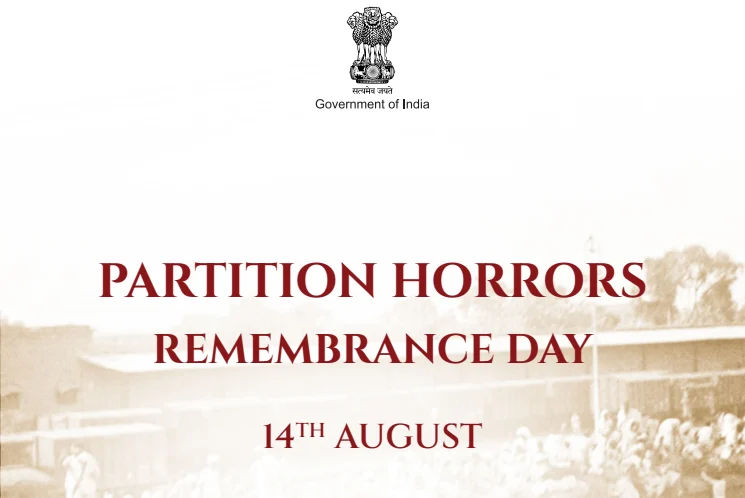Partition Horrors Remembrance Day
Partition Horrors Remembrance Day solemnly honors the victims and survivors of India’s 1947 Partition. It reminds us of the enduring pain, urges unity against hatred, and teaches future generations the importance of social harmony and integration.

Why is it in News?
On August 14, 2025, Prime Minister Narendra Modi addressed the nation on Partition Horrors Remembrance Day, marking the anniversary of one of the most tragic events in India’s history—Partition in 1947. Observed each year since its declaration by the government in 2021, this day serves to remember and honor the millions of Indians who suffered immense trauma, loss, and displacement during the division of British India into India and Pakistan.
This commemoration reflects on the enduring wounds of Partition—the world’s largest mass migration—and aims to educate new generations about the destructive force of communal violence, the value of unity, and the lessons of a bitter past.
Purpose and Significance
The principal goal of Partition Horrors Remembrance Day is to solemnly recall the horrors of 1947—its violence, forced migration, and the untold suffering endured by innocents. It is an occasion to pay homage to the countless families who lost their homes, loved ones, and livelihoods, often overnight.
Politically and socially, the day reinforces the values of unity, integrity, and secularism, and highlights the need to transcend religious, linguistic, and regional differences. By remembering the destruction caused by communal division, the commemoration promotes healing, mutual respect, and prevention of similar tragedies in the future.
The day has profound educational importance. It seeks to ensure that younger generations understand the consequences of hatred and the fragility of social harmony, strengthening national integration and encouraging dialogue across communities.
Important Information
- The Partition of 1947 led to the deaths of an estimated 1 to 2 million people and displaced more than 14 million.
- It was the largest exchange of population in recorded human history, as Hindus, Muslims, and Sikhs were forced to abandon ancestral homes across Punjab and Bengal.
- Violence was not only religious but also political, social, and economic in nature.
- Punjab and Bengal bore the brunt of the upheaval, with cultural centers like Lahore and Dhaka deeply affected.
- The trauma of Partition continues to impact refugee families and descendent generations today, with many families still longing for a sense of belonging and closure.
Fact Table
| Aspect | Details |
|---|---|
| Year Established | 2021 |
| Initiator | Government of India |
| Date Observed | August 14 (annually) |
| Partition Year | 1947 |
| Estimated Deaths | 1–2 million |
| Displaced Persons | 14+ million |
| Main Impacted Regions | Punjab, Bengal |
| New Nations Formed | India, Pakistan |
| Core Cause | Nation building on religious basis |
Conclusion
Partition Horrors Remembrance Day is not merely a formal event—it is a wake-up call to collective consciousness. By remembering the agony and destruction of Partition, Indians reinforce their commitment to unity, peace, and the values enshrined in the Constitution.
The day stands as a solemn reminder of how narrow political aims and divisive ideologies can fracture civilizations. In contemporary times, as religious and ethnic tensions surge globally, the lessons of Partition urge us to uphold tolerance and harmony.
India’s strength lies in its diversity and plurality. Only by learning from the wounds of Partition can the country hope to prevent future tragedies and build a society rooted in inclusiveness and understanding.
Key Facts
- Government of India declared August 14 as Partition Horrors Remembrance Day in 2021
- Memorializes 1–2 million deaths and 14+ million displaced during 1947 Partition
- Largest migration in recorded history; trauma still felt by descendant families
- Observed nationwide: exhibitions, discussions, plays, photo exhibitions (UGC, NSD)
- Focuses educational efforts on peace, secularism, integration
- Aims to strengthen national unity, prevent recurrence of communal strife
UPSC Practice Questions
- Analyze the causes and long-term impacts of the Partition of India in 1947. Justify the establishment of Partition Horrors Remembrance Day.
- Assess the socio-economic and cultural consequences of the mass migration during Partition and discuss its relevance today.
- Discuss the lessons Partition offers for India’s commitment to secularism and national integration.
- Evaluate how shared historical memory can help maintain communal harmony in contemporary India.
